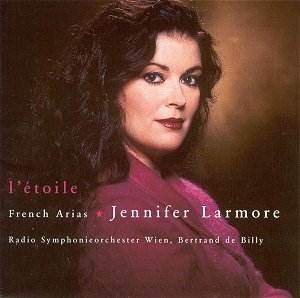Discs of French arias by mezzo-sopranos are becoming
the order of the day. After "Nuits résplendissants"
by Vesselina Kasarova, which I have reviewed, and "Flamme
d’amour" by Monica Groop, which I haven’t heard, now we have
"L’étoile" from Jennifer Larmore, a title no
doubt intended to refer not only to the last opera represented
but also to the lady herself. It is good to find that, while Groop’s
disc sticks to standard fare, both Kasarova and Larmore include
some more enterprising choices among the predictable ones.
I wrote very enthusiastically about Kasarova’s
recital, but I see that in other quarters it has been practically
rubbished on the grounds of her heavily Slavonic French. I must
confess I was so taken up by the urgency of her communication
that I didn’t let it worry me. On repetition I find it does begin
to disturb and I hope she will do some work with a good language
coach. Larmore offers, at the very least, French of a good international
standard. If you want to carp, her pronunciation of words such
as "amour" seems to have all "u" and no "o",
we miss the piquancy of the fleeting "u" in a word like
"fuit" and endings such as "vent" are less
nasal than the French themselves make them. So if you are sensitive
over these matters, you have been warned.
Larmore has made a particular reputation as a
Rossini singer, and we can hear why in the Auber piece, very much
in the Rossini mould. Brilliant articulation, plenty of bite on
the words, and a sustained top C which many of her mezzo colleagues
must envy. The Chabrier extract also shows a lively personality,
stylish without recourse to the swooping which I felt (though
most critics didn’t) so disfigured von Otter’s recent Offenbach
recital. She is certainly a mezzo with soprano leanings; Cendrillon
and Marguérite in Berlioz’s Faust are roles usually undertaken
by mezzos like Frederica von Stade who have toyed with becoming
full sopranos at some time in their careers. And, like Kasarova,
she sings "O ma lyre immortelle" in B flat (there is
a version in A which many mezzos prefer), and seems securer than
Kasarova on the final top note. On the other hand, no one who
hears the richness of tone she employs in the aria from Werther
would doubt that she is a true mezzo.
If we compare Larmore in the Saint-Saëns
aria with a singer like Grace Bumbry who is content with a rich,
even delivery of the music (and who occasionally re-distributes
the words to suit herself), we find Larmore much more alert to
what she is singing about. However, the comparison with Kasarova
in the extract from Les Troyens and in "O ma lyre immortelle"
is revelatory; there is so much more communication and life to
Kasarova’s performances. Good though she is, Larmore has a tendency
to wallow in the richness of her voice, notably in the very slow
tempo adopted for "D’amour l’ardente flamme". On the
other hand, she avoids making the Mignon romance sound lugubrious
as Kasarova does.
So far, Larmore’s forays into music later than
Rossini and Donizetti have been mostly limited to American song
(though she has given us Carmen). She certainly succeeds in showing
that she has a more romantic side, so let us hope this discs heralds
some complete recordings of major French romantic roles.
Christopher Howell

